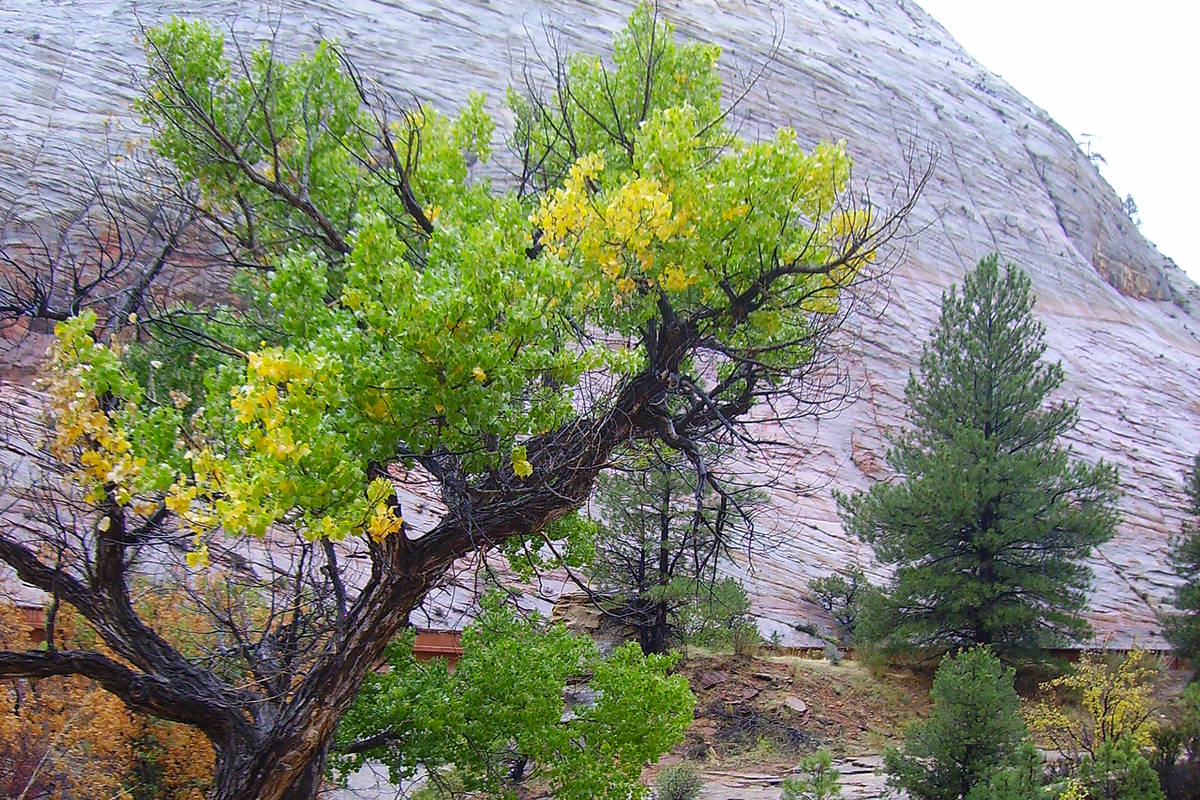Zion’s Pa’rus Trail meanders along Virgin River’s North Fork

With the promise of cooler autumn temperatures coming, my thoughts always go to Zion National Park in Utah.
Just a few hours’ drive from Las Vegas, the park seems worlds away with its majestic red sandstone monoliths, mature deciduous trees and diverse wildlife surrounding the banks of the North Fork of the Virgin River.
Because of the COVID-19 pandemic, shuttle access to Zion Canyon Scenic Drive and some of the park’s most popular trails takes a bit more planning than usual, but the park offers plenty of other great trails that are easily accessible.
One is the Pa’rus Trail, which is about 3½ miles round trip. It starts off near the Zion Canyon Visitor Center, at South Campground, and travels to the entrance of the Scenic Drive.
The paved trail meanders along the North Fork of the Virgin River, crossing five bridges along the way. At an elevation of 3,915 feet, you can expect daytime high temperatures in late September to run in the 80s and in October in the 70s. In some areas of the park, the leaves have begun to turn their fall colors, but in the main area, like here, you won’t see peak foliage until the end of October, continuing through early November.
The Pa’rus Trail makes a great outing for families of all ages and abilities, as it’s flat and easy and is the only trail in the park that allows bicycles. It also is suitable for jogging, strollers and wheelchairs, with assistance. You will get incredible views of the park’s signature sandstone monoliths, all while being in a lush riparian ecosystem dominated by Fremont cottonwood, box elder and single-leaf ash trees.
With a constant supply of water and healthy vegetation, the area is home to plenty of wildlife. It’s common to see mule deer during the day, but most mammals here are nocturnal, although you might see evidence of them from their scat or prints in the sand. Wildlife here includes bobcats, gray foxes, raccoons, badgers, ringtail cats and the top predators in Zion, mountain lions. In fall, birds you could see include ospreys, Cooper’s hawks, red-tailed hawks, wild turkeys, red-naped sapsuckers, hairy woodpeckers, violet-green swallows, black-capped and mountain chickadees.
As you travel along the trail, look up on your right (south) to Bridge Mountain, 6,814 feet high, and try to locate Crawford Arch. This long, thin, bowed arch is about 150 feet long yet only about 3 to 4 feet wide. It is located to the left of the peak, to the right side of an obvious saddle. Bring binoculars for a better look.
To meet COVID-19 public health regulations, the park has implemented a reservation system for the shuttle to visit the most popular destination in the park, Zion Canyon Scenic Drive. It’s only a $1 fee, good for one boarding from the Visitor Center, but once in the canyon you can stay as long as you want and get on and off at different shuttle stops. Tickets are available at recreation.gov (put “Zion” in the search box) or by calling 877-444-6777.
Tickets are available online for one-hour boarding blocks, between 7 a.m. and 3 p.m. During your allotted time, you can board the next available shuttle; they leave about every five minutes. Advance shuttle tickets for Oct. 16-31 will be released Sept. 30. If you wish to go sooner, additional tickets might be available one day in advance of your visit at 9 a.m. Mountain time, but these sell out quickly. Those without advance tickets may board between 3 and 6 p.m. on a first-come, first-served basis, but boarding is not guaranteed.
While the Virgin River remains beautiful to see, currently there is a toxic cyanobacteria bloom. It’s being monitored closely, and for the time being the park is asking visitors, including children and pets, not to go into the water. This organism is especially toxic to children and dogs.
For more information on Zion National Park, go to nps.gov/zion or call 435-772-3256.